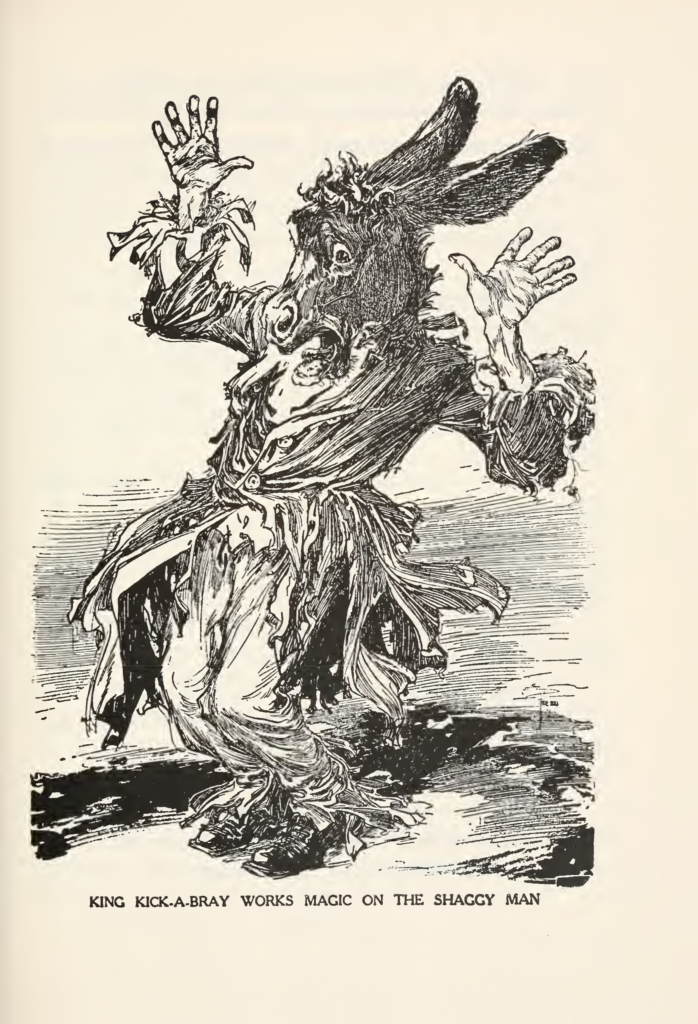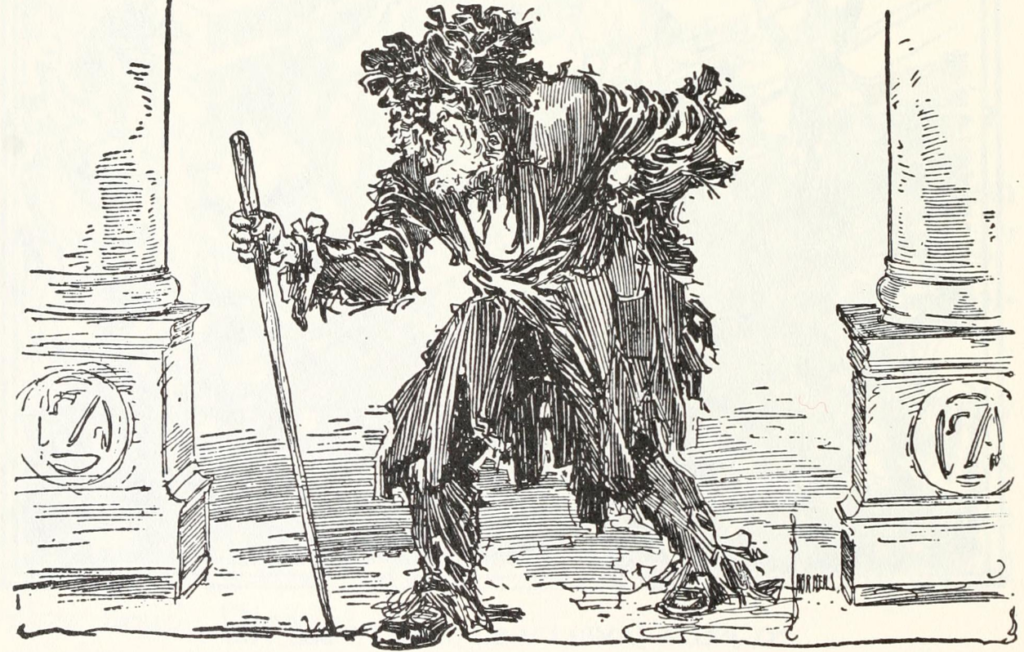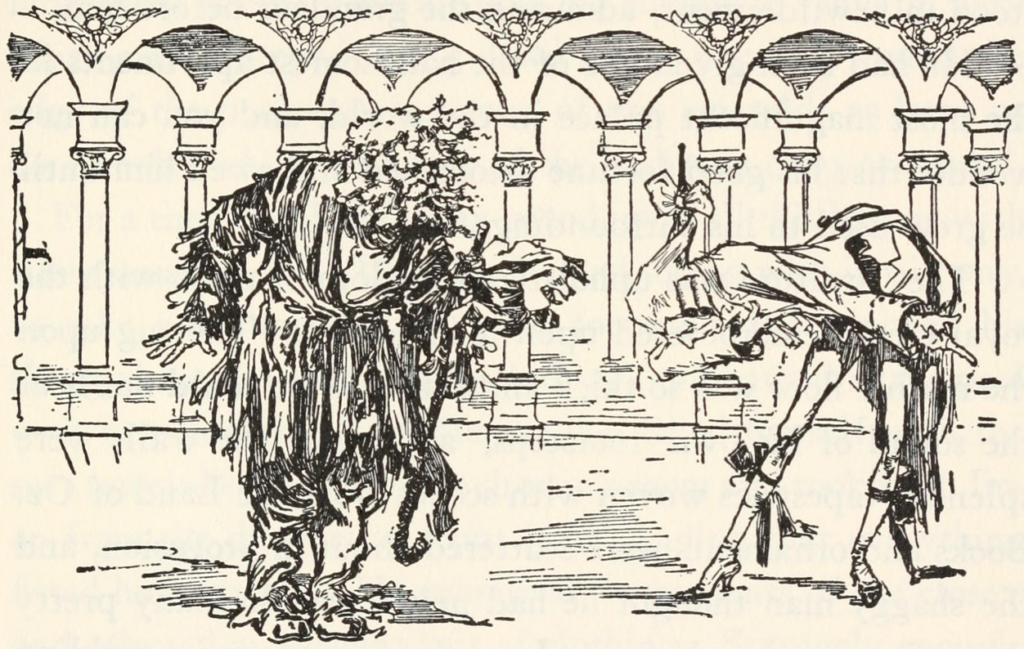
Reeling from the transformation, the shaggy man says, “What a misfortune—what a great misfortune! Give me back my own head, you stupid king—if you love me at all!” Kik-a-bray, however, a donkey himself and an arrogant and pseudointellectual buffoon, genuinely considers this “the greatest gift within [his] power” (82). Some people’s selfish notion of love does not mean accepting others for who they are but forcing the object of adoration to become what they themselves want the beloved to be. The Scoodlers later claim they want to eat the shaggy man and his companions because they love him: “We love you very much; so much that we intend to eat your broth with real pleasure” (117–118). “Love” is not always desirable.
Strangely, Baum never questions the ethics of magically overriding other people’s free will to force them to love you. But he does further complicate the situation when the shaggy man meets Ozma. Because he bathed in the Truth Pond to restore his head to normal, he can no longer lie, so the shaggy man admits that he stole the Love Magnet.
“Why did you steal it?” asked Ozma, gently.
“Because no one loved me, or cared for me,” said the shaggy man, “and I wanted to be loved a great deal” (208).

In reality, the shaggy man stole the Love Magnet from a woman in Butterfield. He might have wanted to reach the town in order to return it, though in his truthful state he also says the woman is happier without it because its absence revealed the suitor who genuinely loved her. As a homeless wanderer, the shaggy man could find no affection except by stealing it because in “the big, cold, outside world” (196) beyond Oz, a place even in the fairy countries home to cruel people like the Scoodlers, Evoldo, the Nome King, and the Gargoyles, nobody accepted his strange ways. In Oz, however, he is overwhelmed, and somewhat embarrassed, to be ushered around and given attention by servants in first the Tin Woodman’s and then Ozma’s palaces. He is welcomed by everyone everywhere he goes because Oz does not use money. (It did in The Wonderful Wizard of Oz, but perhaps Ozma has made some changes.)

Despite the shaggy man’s poverty and strange appearance, the Ozites would love and accept him for his kindness even without the Love Magnet’s effect. The Tin Woodman tells him, “We have no rich, and no poor; for what one wishes the others all try to give him, in order to make him happy, and no one in all Oz cares to have more than he can use” (165). After bathing, the shaggy man changes into exquisite clothes Ozma provides, which are still shaggy, thereby preserving his identity despite his improved material conditions. He then confesses his thievery to Ozma. The shaggy man decides he wants to live in Oz always, but Ozma says this means he must give up the Love Magnet because “in Oz we are loved for ourselves alone, and for our kindness to one another” (210) and not for magic spells. Ozma decides to hang the Love Magnet over the gates of the Emerald City, “that whoever shall enter or leave the gates may be loved and loving” (210).
So, following a baptism in the Truth Pond and then a baptism in the palace, the shaggy man confesses his sins and is allowed to live in Paradise. Neill does often draw Ozma emitting a radiant halo of light. And it is interesting that characters usually enter Oz by a disaster that in real life would kill them. Christian cultural osmosis.
The Scarecrow, the Tin Woodman, and the Cowardly Lion (whom are on the cover for some reason when the shaggy man, Button-Bright, and Polly are not) are interesting in The Wonderful Wizard of Oz and instructive to young readers because each longs for a quality that he actually already possesses. From the get-go, the Scarecrow is the smartest member of the group, the Tin Woodman is the kindest, and the Cowardly Lion never has any shortage of courage. It is just that each imagines himself deficient. Along the course of their journey, a rather more interesting journey than in The Road to Oz, the characters sometimes discuss whether a heart is better than brains, and so on. But ultimately, Dorothy learns that it is not an either/or situation because the whole group reaches a happy conclusion together by cooperating.